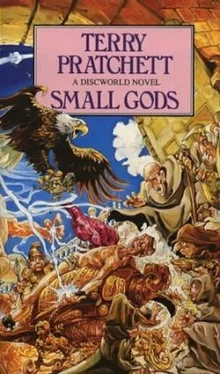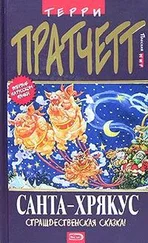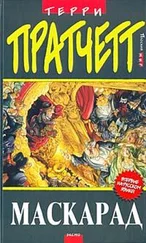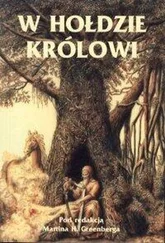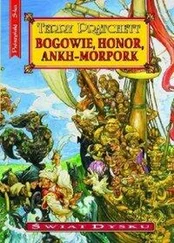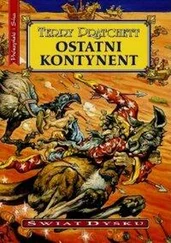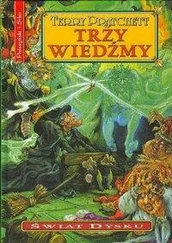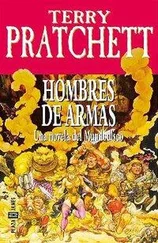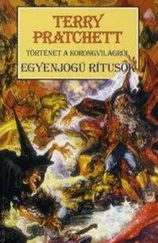Terry Pratchett - Small Gods
Здесь есть возможность читать онлайн «Terry Pratchett - Small Gods» весь текст электронной книги совершенно бесплатно (целиком полную версию без сокращений). В некоторых случаях можно слушать аудио, скачать через торрент в формате fb2 и присутствует краткое содержание. Жанр: Юмористическая фантастика, на английском языке. Описание произведения, (предисловие) а так же отзывы посетителей доступны на портале библиотеки ЛибКат.
- Название:Small Gods
- Автор:
- Жанр:
- Год:неизвестен
- ISBN:нет данных
- Рейтинг книги:4 / 5. Голосов: 1
-
Избранное:Добавить в избранное
- Отзывы:
-
Ваша оценка:
- 80
- 1
- 2
- 3
- 4
- 5
Small Gods: краткое содержание, описание и аннотация
Предлагаем к чтению аннотацию, описание, краткое содержание или предисловие (зависит от того, что написал сам автор книги «Small Gods»). Если вы не нашли необходимую информацию о книге — напишите в комментариях, мы постараемся отыскать её.
Small Gods — читать онлайн бесплатно полную книгу (весь текст) целиком
Ниже представлен текст книги, разбитый по страницам. Система сохранения места последней прочитанной страницы, позволяет с удобством читать онлайн бесплатно книгу «Small Gods», без необходимости каждый раз заново искать на чём Вы остановились. Поставьте закладку, и сможете в любой момент перейти на страницу, на которой закончили чтение.
Интервал:
Закладка:
Small Gods
Now consider the tortoise and the eagle.
The tortoise is a ground-living creature. It is impossible to live nearer the ground without being under it. Its horizons are a few inches away. It has about as good a turn of speed as you need to hunt down a lettuce. It has survived while the rest of evolution flowed past it by being, on the whole, no threat to anyone and too much trouble to eat.
And then there is the eagle. A creature of the air and high places, whose horizons go all the way to the edge of the world. Eyesight keen enough to spot the rustle of some small and squeaky creature half a mile away. All power, all control. Lightning death on wings. Talons and claws enough to make a meal of anything smaller than it is and at least take a hurried snack out of anything bigger.
And yet the eagle will sit for hours on the crag and survey the kingdoms of the world until it spots a distant movement and then it will focus, focus, focus on the small shell wobbling among the bushes down there on the desert. And it will leap . . .
And a minute later the tortoise finds the world dropping away from it. And it sees the world for the first time, no longer one inch from the ground but five hundred feet above it, and it thinks: what a great friend I have in the eagle.
And then the eagle lets go.
And almost always the tortoise plunges to its death. Everyone knows why the tortoise does this. Gravity is a habit that is hard to shake off. No one knows why the eagle does this. There's good eating on a tortoise but, considering the effort involved, there's much better eating on practically anything else. It's simply the delight of eagles to torment tortoises.
But of course, what the eagle does not realize is that it is participating in a very crude form of natural selection.
One day a tortoise will learn how to fly.
The story takes place in desert lands, in shades of umber and orange. When it begins and ends is more problematical, but at least one of its beginnings took place above the snowline, thousands of miles away in the mountains around the Hub [1].
One of the recurring philosophical questions is:
"Does a falling tree in the forest make a sound when there is no one to hear?"
Which says something about the nature of philosophers, because there is always someone in a forest. It may only be a badger, wondering what that cracking noise was, or a squirrel a bit puzzled by all the scenery going upwards, but someone. At the very least, if it was deep enough in the forest, millions of small gods would have heard it.
Things just happen, one after another. They don't care who knows. But history . . . ah, history is different. History has to be observed. Otherwise it's not history. It's just . . . well, things happening one after another.
And, of course, it has to be controlled. Otherwise it might turn into anything. Because history, contrary to popular theories, is kings and dates and battles. And these things have to happen at the right time. This is difficult. In a chaotic universe there are too many things to go wrong. It's too easy for a general's horse to lose a shoe at the wrong time, or for someone to mishear an order, or for the carrier of the vital message to be waylaid by some men with sticks and a cash flow problem. Then there are wild stories, parasitic growths on the tree of history, trying to bend it their way.
So history has its caretakers.
They live . . . well, in the nature of things they live wherever they are sent, but their spiritual home is in a hidden valley in the high Ramtops of the Discworld, where the books of history are kept.
These aren't books in which the events of the past are pinned like so many butterflies to a cork. These are the books from which history is derived. There are more than twenty thousand of them; each one is ten feet high, bound in lead, and the letters are so small that they have to be read with a magnifying glass.
When people say "It is written . . ." it is written here.
There are fewer metaphors around than people think.
Every month the abbot and two senior monks go into the cave where the books are kept. It used to be the duty of the abbot alone, but two other reliable monks were included after the unfortunate case of the
59th Abbot, who made a million dollars in small bets before his fellow monks caught up with him.
Besides, it's dangerous to go in alone. The sheer concentratedness of History, sleeting past soundlessly out into the world, can be overwhelming. Time is a drug. Too much of it kills you.
The 493rd Abbot folded his wrinkled hands and addressed Lu-Tze, one of his most senior monks. The clear air and untroubled life of the secret valley was such that all the monks were senior; besides, when you work with Time every day, some of it tends to rub off.
"The place is Omnia," said the abbot, "on the Klatchian coast."
"I remember," said Lu-Tze. "Young fellow called Ossory, wasn't there?"
"Things must be . . . carefully observed," said the abbot. "There are pressures. Free will, predestination . . . . the power of symbols . . . turning-point . . . you know all about this."
"Haven't been to Omnia for, oh, must be seven hundred years," said Lu-Tze. "Dry place. Shouldn't think there's a ton of good soil in the whole country, either."
"Off you go, then," said the abbot.
"I shall take my mountains," said Lu-Tze. "The climate will be good for them."
And he also took his broom and his sleeping mat. The history monks don't go in for possessions. They find most things wear out in a century or two.
It took him four years to get to Omnia. He had to watch a couple of battles and an assassination on the way, otherwise they would just have been random events.
It was the Year of the Notional Serpent, or two hundred years after the Declaration of the Prophet Abbys.
Which meant that the time of the 8th Prophet was imminent.
That was the reliable thing about the Church of the Great God Om. It had very punctual prophets. You could set your calendar by them, if you had one big enough.
And, as is generally the case around the time a prophet is expected, the Church redoubled its efforts to be holy. This was very much like the bustle you get in any large concern when the auditors are expected, but tended towards taking people suspected of being less holy and putting them to death in a hundred ingenious ways. This is considered a reliable barometer of the state of one's piety in most of the really popular religions. There's a tendency to declare that there is more backsliding around than in the national toboggan championships, that heresy must be torn out root and branch, and even arm and leg and eye and tongue, and that it's time to wipe the slate clean. Blood is generally considered very efficient for this purpose.
And it came to pass that in that time the Great God Om spake unto Brutha, the Chosen One:
"Psst!"
Brutha paused in mid-hoe and stared around the Temple garden.
"Pardon?" he said.
It was a fine day early in the lesser Spring. The prayer mills spun merrily in the breeze off the mountains. Bees loafed around in the bean blossoms, but buzzed fast in order to give the impression of hard work. High above, a lone eagle circled.
Brutha shrugged, and got back to the melons.
Yea, the Great God Om spake again unto Brutha, the Chosen One:
"Psst!"
Brutha hesitated. Someone had definitely spoken to him from out of the air. Perhaps it was a demon. Novice master Brother Nhumrod was hot on the subject of demons. Impure thoughts and demons. One led to the other. Brutha was uncomfortably aware that he was probably overdue a demon.
The thing to do was to be resolute and repeat the Nine Fundamental Aphorisms.
Once more the Great God Om spake unto Brutha, the Chosen One:
Читать дальшеИнтервал:
Закладка:
Похожие книги на «Small Gods»
Представляем Вашему вниманию похожие книги на «Small Gods» списком для выбора. Мы отобрали схожую по названию и смыслу литературу в надежде предоставить читателям больше вариантов отыскать новые, интересные, ещё непрочитанные произведения.
Обсуждение, отзывы о книге «Small Gods» и просто собственные мнения читателей. Оставьте ваши комментарии, напишите, что Вы думаете о произведении, его смысле или главных героях. Укажите что конкретно понравилось, а что нет, и почему Вы так считаете.
